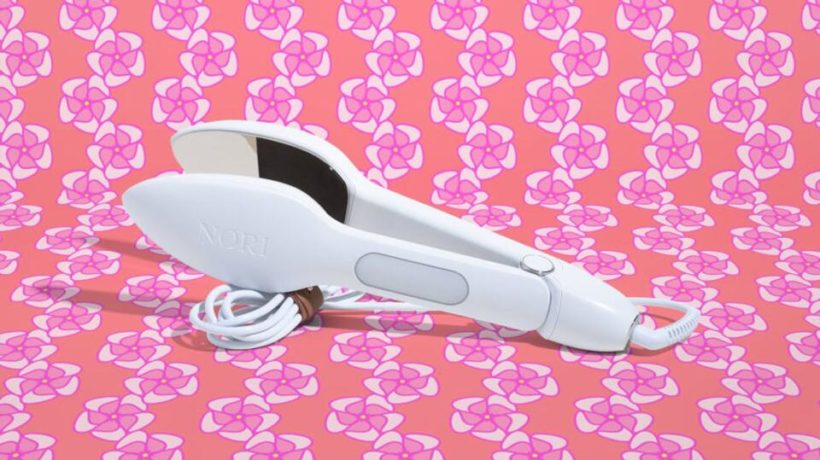It’s not a mistake that the Nori Press looks like an oversize, high-end hair straightener. The creators were inspired by savvy travelers who would run a hair iron across collars and seams in a pinch.
The makers of Nori, a modern, handheld steam iron, are betting on consumers ditching their WFH wardrobes and readopting their wrinkle-free lifestyles yet again. Their hero product, the $US120 Nori Press, is a steam-iron hybrid anchored by a hinge and two triangular aluminium plates that sandwich and glide across fabric with a squeeze-and-slide motion.
Nori—iron spelled backward—was founded by Courtney Toll and Annabel Love, who wanted a new solution to clothing care that spoke to millennial and Gen Z clientele. After interviewing more than 500 potential consumers in their market (and finding that many relied on makeshift wrinkle-release solutions that ranged from pressing clothing between mattresses to hanging them in a steamy shower), Nori raised $1.3 million across two rounds to develop a working prototype before launch in May 2021.
It’s not a mistake that the Nori Press looks like an oversize, high-end hair straightener. Toll and Love were inspired by savvy travelers who would run a hair iron across collars and seams in a pinch. The Nori, however, is bigger – 35 cm long, weighing 0.6 kg— and is designed to glide down garments, inching toward the center with each swipe. The unit has a small chamber for water (or for Fabric Facial, their $15 deionized water) that can be controlled along with the six heat settings, ranging from Denim to Linen, via buttons and a white LED on the handle.
It’s clever: an intuitive tool that makes the act of crisping up a shirt much easier than dragging out an ironing board or refilling a steamer. The Nori Press heats up in about three minutes and requires users to hang or lay a garment and hold it taut as you drag the iron, applying pressure as you go. I swiped through a pair of wide-leg chambray trousers that I LOVE (and would have been devastated to lose if the iron destroyed them) and was left with soft, wrinkle-free pants. Fresh-from-the-dryer crinkled pillowcases got a quick touch-up for a crisper, more luxurious bedding upgrade I would never have bothered with otherwise. And a wrinkled cotton dress, balled up in a suitcase from the weekend, looked fresh after a three-minute session with Nori.
Still, Nori struggles in a few areas. Steam can be activated with another tap of a button, but I had less luck there, as the machine sputtered and sprayed when I didn’t pause to tilt the unit up vertically regularly enough. Clothing that has folds, pleats, and curves is clumsy, if not impossible, to press smooth without the tapered end of an ironing board. Toll said the unit is designed to reach the center of a 22-inch shirt (or an average women’s size large) with extra wiggle room, but I wonder how a plus-size women’s or large men’s shirt would fare, as some of my more billowy mediums were crumpled in the journey to the middle. And even though it only weighs 1.4 lbs, after a few runs, my wrist and hand were tired.
That said, business travelers (or, honestly, any traveler who doesn’t like wrinkled clothes) will likely find a friend in Nori. As will those who don’t want a full-size ironing board and iron (or steamer) in their first apartment or home. While the world reopens, the Nori team plans to remain DTC as Love surveys the places Nori could pop up next: cruise ships, locker rooms, luxury hotels. They want Nori to be your fashionably disruptive knight in shining steel armor.
“Like Away or Casper…There’s a way that exciting brands can open a ‘nothing fancy’ market and offer superior customer service, where the packaging itself is a present,” says Love. “That’s our goal—your once-dreaded chore can be a gift.”
_______________________________________________________________
Article originally published on fastcompany.com.







